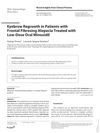Search
for
Sort by
Research
60-90 / 1000+ resultsresearch Randomized Clinical Trial of Low-Dose Oral Minoxidil for the Treatment of Female Pattern Hair Loss: 0.25 mg Versus 1 mg
1 mg/day of low-dose oral minoxidil is effective and safe for treating female hair loss.

research Coming Full Circle (Almost): Low Dose Oral Minoxidil for Alopecia
Low-dose oral minoxidil is an effective and safe treatment for hair loss.

research Low Dose Oral Minoxidil for the Treatment of Female Pattern Hair Loss
Low-dose oral minoxidil can help increase hair growth in women with hair loss.

research Low-Dose Oral Minoxidil for Female Pattern Hair Loss: A Unicenter Descriptive Study of 148 Women
Low-dose oral minoxidil effectively treats female hair loss with good safety.

research Eyebrow Regrowth in Patients with Frontal Fibrosing Alopecia Treated with Low-Dose Oral Minoxidil
Low-dose oral minoxidil helped regrow eyebrows in women with Frontal Fibrosing Alopecia.

research Side Effects of Low-Dose Oral Minoxidil for Treating Alopecia
Low-dose oral minoxidil can be effective for hair loss but should be avoided in people with certain heart conditions and severe liver problems.

research Effectiveness and Safety of Low-Dose Oral Minoxidil in Male Androgenetic Alopecia
Low-dose oral minoxidil effectively improves male hair loss with mild side effects.

research Minoxidil: Effectiveness and Prospects for Use in the Treatment of Androgenetic Alopecia
Minoxidil is an effective and safe treatment for common hair loss when applied to the skin, but more research is needed for optimal use.

research The Impact of Monotherapies for Male Androgenetic Alopecia: A Network Meta-Analysis Study
"Dutasteride 0.5 mg daily is the most effective treatment for male hair loss."

research Low-Dose Oral Minoxidil and Associated Adverse Events: Analyses of the FDA Adverse Event Reporting System With a Focus on Pericardial Effusions
Low-dose oral minoxidil can cause serious side effects like heart issues, so use the lowest effective dose.

research Dermatologists' Knowledge, Attitude, and Practice Pattern Toward Low-Dose Oral Minoxidil in Hair Loss in Saudi Arabia
Saudi dermatologists know about low-dose oral minoxidil for hair loss but don't often prescribe it, partly due to its unavailability.

research Medical Management Options for Hair Loss
The document concluded that FDA-approved treatments like minoxidil and finasteride are effective for hair loss, while the effectiveness of natural remedies and other non-approved treatments is not well-supported by evidence.

research Combination of Oral Minoxidil and Bicalutamide for the Treatment of Female Pattern Hair Loss in Adolescents
Combining oral minoxidil and bicalutamide may help improve hair growth in adolescent girls.
research A Systematic Review of Clinical Trials Using Single or Combination Therapy of Oral or Topical Finasteride for Women in Reproductive Age and Postmenopausal Women with Hormonal and Nonhormonal Androgenetic Alopecia
Oral and topical finasteride are effective and safe for treating female hair loss.

research Efficacy and Safety of Oral Minoxidil in Female Androgenetic Alopecia
Oral minoxidil improves hair density in women with androgenetic alopecia, with mild side effects.

research Treatment Options for Alopecia
The document concludes that oral finasteride and topical minoxidil are effective for genetic hair loss, while other treatments for different types of hair loss show promise but need more research.

research Topically Applied Minoxidil in Baldness
Minoxidil, when applied to the scalp, can stimulate hair growth but effects vary, stop if treatment ends, and it may cause side effects like fluid retention.
research BH16: Trichorrhexis Nodosa Improving with Oral Minoxidil: A Case Report

research Androgenetic Alopecia in Gender Minority Patients
AGA treatments like minoxidil and LLLLT are safe and effective for gender minority patients.

research Frontal Fibrosing Alopecia: Efficacy of Treatment Modalities
Some treatments can stabilize Frontal Fibrosing Alopecia, but more research is needed to find effective treatments, and hair transplants often fail.

research Safety Concerns When Using Novel Medications to Treat Alopecia
Consider benefits and risks of new alopecia treatments for safety.

research Hair Loss in Men and Women: Medical and Surgical Treatments for Androgenic Alopecia
The document concludes that ongoing medical therapy is crucial for preventing hair loss, and surgical options can restore hair, with future treatments for hair loss being promising.

research Androgenetic Alopecia: Therapy Update
There are many treatments for common hair loss, but more trials are needed to decide which are best.

research Spironolactone for Treatment of Female Pattern Hair Loss
Spironolactone effectively treats female pattern hair loss with few side effects.

research Prevention and Treatment of Chemotherapy-Induced Alopecia: What Is Available and What Is Coming?
Scalp cooling is the only FDA-approved method to prevent hair loss from chemotherapy, but other treatments like minoxidil and PRP are being tested.

research Guidelines Based Management of Androgenetic Alopecia
The document concludes that personalized treatment plans for hair loss in Asian men are necessary and more research is needed to develop effective guidelines.

research Advances in Hair Growth
The best long-lasting results in treating hair loss may be achieved through combination therapy, including treatments like finasteride, minoxidil, and platelet-rich plasma injections.

research Topically Applied Minoxidil in Baldness
Minoxidil helps hair growth, but results vary.

research Therapeutic Efficacy of a Combination Therapy of Topical 17α-Estradiol and Topical Minoxidil on Female Pattern Hair Loss: A Noncomparative, Retrospective Evaluation
Combination of 17α-estradiol and minoxidil improves hair growth and reduces hair loss in most patients.